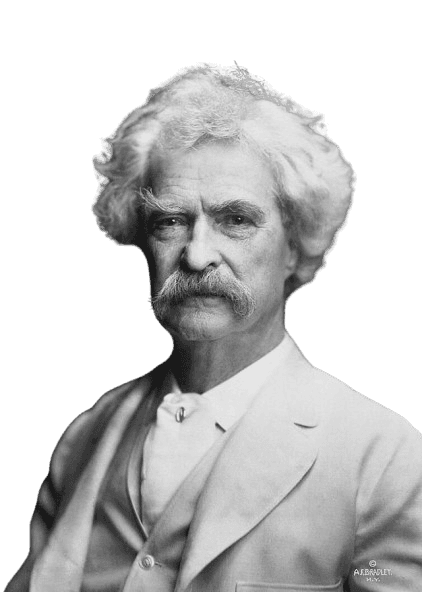Life and achievements
Early life
Mark Twain, whose real name was Samuel Langhorne Clemens, was born on November 30, 1835, in Florida, Missouri.
He was the sixth child out of seven children to John Marshall Clemens and Jane Lampton Clemens. His early childhood was not very healthy, and he was prone to diseases, and several of his siblings died during his childhood.
He was four years old when his family shifted their home to Hannibal, Missouri, a small town on the Mississippi River, and this became the background of his famous works.
Twain's father, an attorney and merchant, was not very successful, and the family faced severe financial hardships; Twain's father passed away in 1847, putting the family in an even worse condition.
Twain left school at the age of eleven and went to work as a printer's apprentice; he wrote articles and humorous pieces for his brother Orion's newspaper, the Hannibal Journal.
It is with this that Twain was introduced to the world of print media, and this sparked his interest in writing.
In his early life, Twain was a printer in New York, Philadelphia, and St. Louis, and later on trained as a riverboat pilot on the Mississippi River.
This experience had a significant impact on his writing and gave him the imagery and dialects that were used in his writings. It became an important motif in his prose works, as the image of freedom, the quest, and the American reality.
Twain's journey to Nevada in 1861 to work for his brother Orion initiated his writing career. He started using the pen name Mark Twain, a term used during his time as a riverboat pilot and began contributing humorous pieces and travelogues.
He began his writing career with works inspired by his experiences in the American West, such as Roughing It and The Celebrated Jumping Frog of Calaveras County, which made him famous.
Legacy
Mark Twain left a great legacy behind, and this is in agreement with the fact that he was one of the greatest writers in American literature. He is known as the father of American literature because he was the first to introduce the use of American slang and the portrayal of American society. Mark Twain's works are still famous for their humor, social satire, and deep understanding of people's character.
Both The Adventures of Tom Sawyer and Adventures of Huckleberry Finn are still popular today, are included in the curriculums of schools, and are popular among young and old readers.
These novels, based on the pre-Civil War South, present an African American point of view on issues of race, individuality, and ethics. Through the story, Twain presents Huck Finn's voyage on the Mississippi River with Jim, an enslaved Black person, and thus breaks all the conventional norms of society of that time and even of today.
Twain's impact does not stop at the literary works. He is a man of few words but words that are often very wise, and his humor has earned him a place in the annals of American culture, and his quotes and sayings are frequently repeated.
Twain's use of humor and humanity makes his works relevant to this day. Even though Twain experienced some financial problems and a number of misfortunes in his life, he always remained a persistent and inventive writer.
He never stopped writing and teaching, and to this day, he has produced a vast number of novels, essays, short stories, and memoirs. Twain's use of unconventional narrative and his adherence to the principles of realism has influenced many writers and philosophers.
The house where Twain lived in Hartford, Connecticut, is now a museum of the life and works of Mark Twain, which people from all over the world visit. His works are also kept alive by several literary societies, academic research, and film, theatrical, and other adaptations. Thus, the impact of Mark Twain on the literary world and culture is a guarantee that the world will still be listening to him.
Join Confinity and create a lasting digital legacy, just like history's greatest minds. Signup Now
Learn how this historical figure's legacy continues to shape our world today →
Milestone moments
Nov 18, 1835
Samuel L. Clemens' Birth
Samuel Langhorne Clemens, who is famously known as Mark Twain, was born in Florida, Missouri.
He had a rather sickly childhood and also experienced the death of many of his siblings.
His family shifted to Hannibal, Missouri, when he was four years old, and this town is the backdrop of many of his works.
The author's formative years in Hannibal are later depicted in his most famous works.
Mar 18, 1847
Death of Twain's Father
John Marshall Clemens died and left the family in a relatively poor state financially.
Samuel ceased his schooling and went on to be an apprentice to a printer, thus concluding his education.
This first step into the print media would be the start of his life-long love affair with words and the written word.
This made Twain a strong person who could face any challenge that came his way, and this prepared him for future achievements.
Apr 18, 1857
Twain Enters Training for Riverboat Pilots
Samuel Clemens began his working career as a riverboat pilot on the Mississippi River.
The river and its culture affected his works and writing in a significant manner.
Twain's pseudonym, which is derived from a riverboat term, epitomizes this phase of transition.
He took part in the life of the river, and this was the basis for his most famous novels.
Nov 18, 1865
The Short Story "The Celebrated Jumping Frog of Calaveras County" is Published
This humorous short story helped Twain gain nationwide fame.
This story was successful, and it is considered to be the start of his writing career.
Thus, Twain's style and sense of humor were prevalent among a large number of readers.
The popularity of the story ensured Twain's position as one of the greatest American humorists.
